RVing for beginners is exciting, a little intimidating, and absolutely worth it. Whether you’re planning a weekend getaway or jumping into full-time RV living, this beginner RV guide will help you hit the road with confidence. In this post, you’ll learn how to start RVing—from choosing the right rig and essential gear to practical RV tips for beginners that make your first trip smoother, safer, and more fun. If you’re just getting started with the RV lifestyle, you’re in the right place.
Dreaming of the open road, starry skies, and waking up to new views each day? Whether you’re planning a weekend getaway or diving headfirst into full-time RV life, this guide is here to help.
As full-time RVers ourselves, we’ve learned a thing or two (okay, a lot) about what works, what doesn’t, and how to avoid the rookie mistakes that can make your first trip stressful. These beginner RV tips are all about making your adventure smoother, safer, and a whole lot more fun.
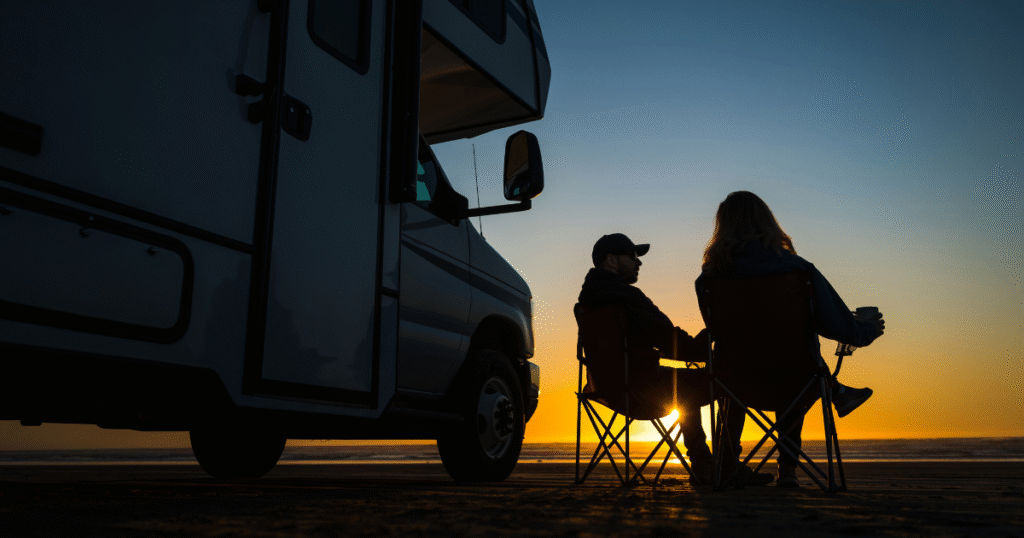
This post contains affiliate links. As a participant in Amazon Associates and various affiliate programs, we are compensated when qualifying purchases are made through our referral links at no additional cost to you. Full Disclosure
RVing for Beginners: Planning and Research Tips
“RVing” can mean a lot of different things. It ranges from off-grid camping in a teardrop trailer to living large in a 45-foot diesel pusher with all the comforts of home. So, before you buy or rent anything, take the time to figure out what kind of experience you want.
Ask yourself:
- Do you want to tow or drive your RV?
- Is this for weekend camping or full-time living?
- Will you need space for kids, pets, hobbies, or work?
- How comfortable are you driving something big?
Types of RVs to Consider:
- Towables: Travel Trailers, 5th Wheels, Toy Haulers, Teardrops, Pop-ups
- Motorhomes: Class A (large and luxurious), Class B (campervans), Class C (mid-size with over-cab sleeping)
- Truck Campers: Compact and rugged, perfect for off-road or solo travel
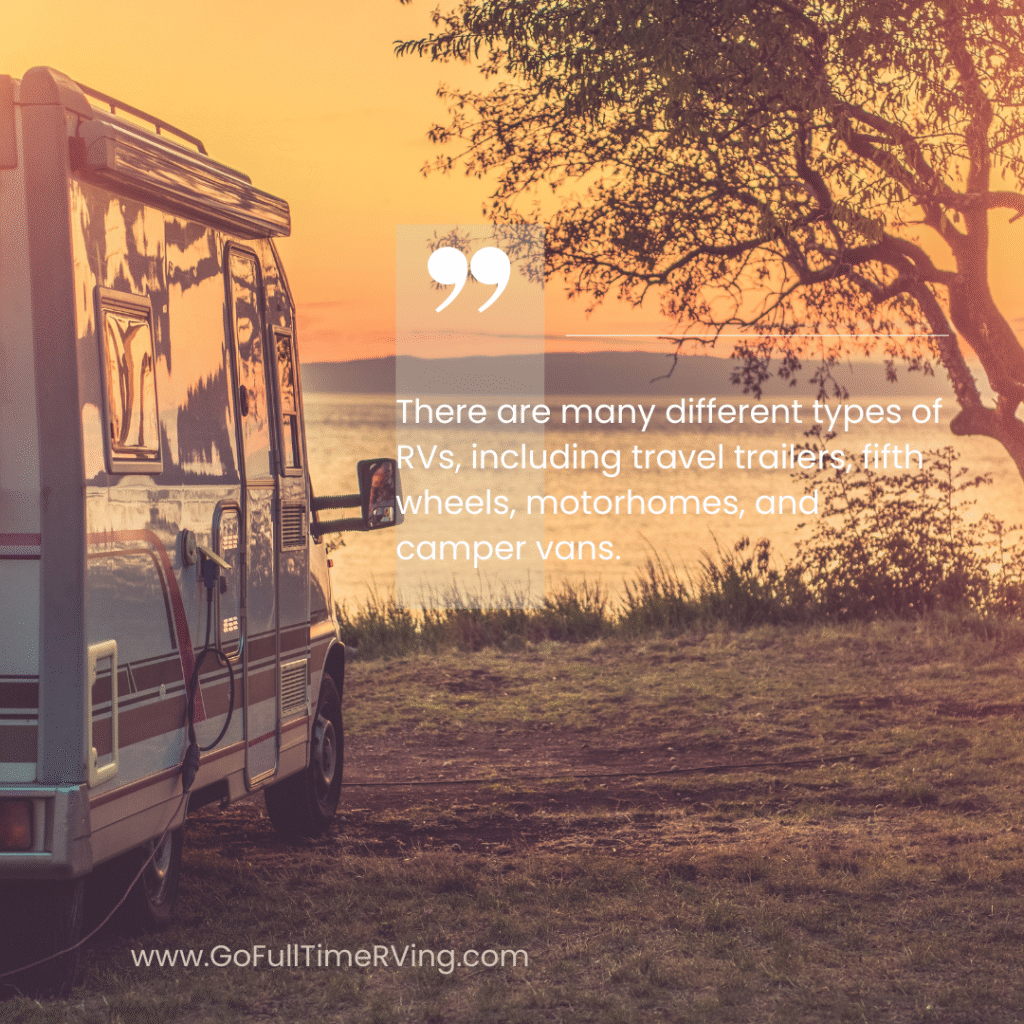
You’ll also want to check if your vehicle can handle the tow weight—or if you’ll need a toad (towed car) behind a motorhome. Get this part right, and the rest gets a lot easier.
Take a Practice Trip Before You Commit
Buying an RV is a big deal. And trust me—what looks good on the dealer lot might not feel good on the road.
Here’s what to do:
- Rent an RV for a weekend or two
- Try out different sizes and layouts
- Practice driving, turning, and backing up
- Learn how to hook up water, sewer, and electricity
- Test the storage, kitchen, and sleeping setup
Camping close to home—or even in your driveway—is a great way to learn. If something goes wrong, you’re just steps from your toolbox or home. And if nothing goes wrong? You’ll gain confidence fast.
RVing for Beginners: Must-Have Accessories and Gear
Buying the RV is only the beginning. Most RVs (especially new ones) don’t come with everything you need to actually use them.
Here’s a list of must-have gear to get started safely and comfortably.
Power and Electrical Gear
- Power Cord – 30 amp or 50 amp, depending on your rig. Most new RVs don’t come with one.
- Surge Protector – Critical for protecting your RV’s electrical system. Campground pedestals can be sketchy.
- Dog Bone Adapters – Useful when the campground doesn’t have the correct amperage. Just know your power limitations when using one.
Safe Water Setup
- Drinking Water Hose – Only use a lead-free hose rated for potable water (not a garden hose).
- Water Pressure Regulator – Keeps campground water pressure from damaging your plumbing.
- Water Filter – Protects your plumbing and makes water taste better from various sources.
Waste Management and Adapters
- Sewer Hose – They are usually the least glamorous pieces of gear—but I can’t stress enough how important quality is. That’s why I strongly recommend stepping up from the RhinoFLEX to the RhinoEXTREME. Spend a little more upfront—it will pay off in durability and fewer headaches down the road.
- Why RhinoEXTREME is worth it:
- It’s built with 24 mil TPE material and a crush‑resistant exoskeleton, offering superior resistance to punctures and flattening compared to the RhinoFLEX.
- Comes with pre‑attached swivel fittings and a 90° clear elbow, making dump hookups easier and cleaner.
- It simply lasts longer. We went 6 months with a RhinoFLEX hose and 5+ years with a RhinoEXTREME.
- Why RhinoEXTREME is worth it:
How to Pack Light and Smart
It’s easy to overpack when you’re excited, but every RV has a weight limit—and space gets tight fast.
Packing Tips:
- Only bring the essentials on your first few trips
- Use bins, stacking containers, and collapsible gear
- Distribute weight evenly and keep heavy stuff low
- Avoid cramming everything into overhead cabinets
Our rule now? If something comes in, something else has to go out. Minimalism is your friend in a small space.
Get Acclimated to Your RV
Before you hit the highway, get to know your RV inside and out.
Do a Dry Run:
- Camp at home or close by
- Practice setting up, dumping tanks, and managing power/water
- Use every system in the RV like you’re really camping
- Make a list of items you forgot or wish you had
Once you’re comfortable, take a couple of weekend trips before planning a long journey. This is how you build skills and confidence without high-stakes stress.
RV Tools and Spare Parts You’ll Want
Even brand-new RVs need maintenance. And trust me—stuff breaks at the worst times.
Bring a basic toolkit and some spare parts to get out of a jam when you’re off-grid or far from a repair shop.
Basic Essentials:
- Screwdrivers, wrenches, sockets
- Multimeter and spare fuses
- Electrical tape, duct tape, zip ties
- Flashlight or headlamp
- Tire pressure gauge (or TPMS system)
- Spare bulbs and basic hardware
You don’t need to be a mechanic, but you do want to be prepared. Being handy is definitely something you need to be if you plan on doing this full-time.
Planning Your First RV Road Trip
You’ve prepped, packed, practiced—and now it’s time to roll! But instead of cramming in as many miles as possible, slow down and enjoy the ride.
Smart Planning Tips:
- Budget: Factor in fuel, campground fees, groceries, and fun money
- Route: Use RV-specific GPS apps like RV Life or CoPilot to avoid low clearances
- Campgrounds: Reserve early, especially in summer or near National Parks
- Meals: Cooking saves cash, but mix in local eats too
- Arrival: Aim to reach camp by 3 or 4 PM. Setting up in the dark is not fun (ask me how I know)
Stay Flexible
Have backup plans in case a campground’s full or the weather turns. The joy of RVing is in the journey—not the rigid schedule.
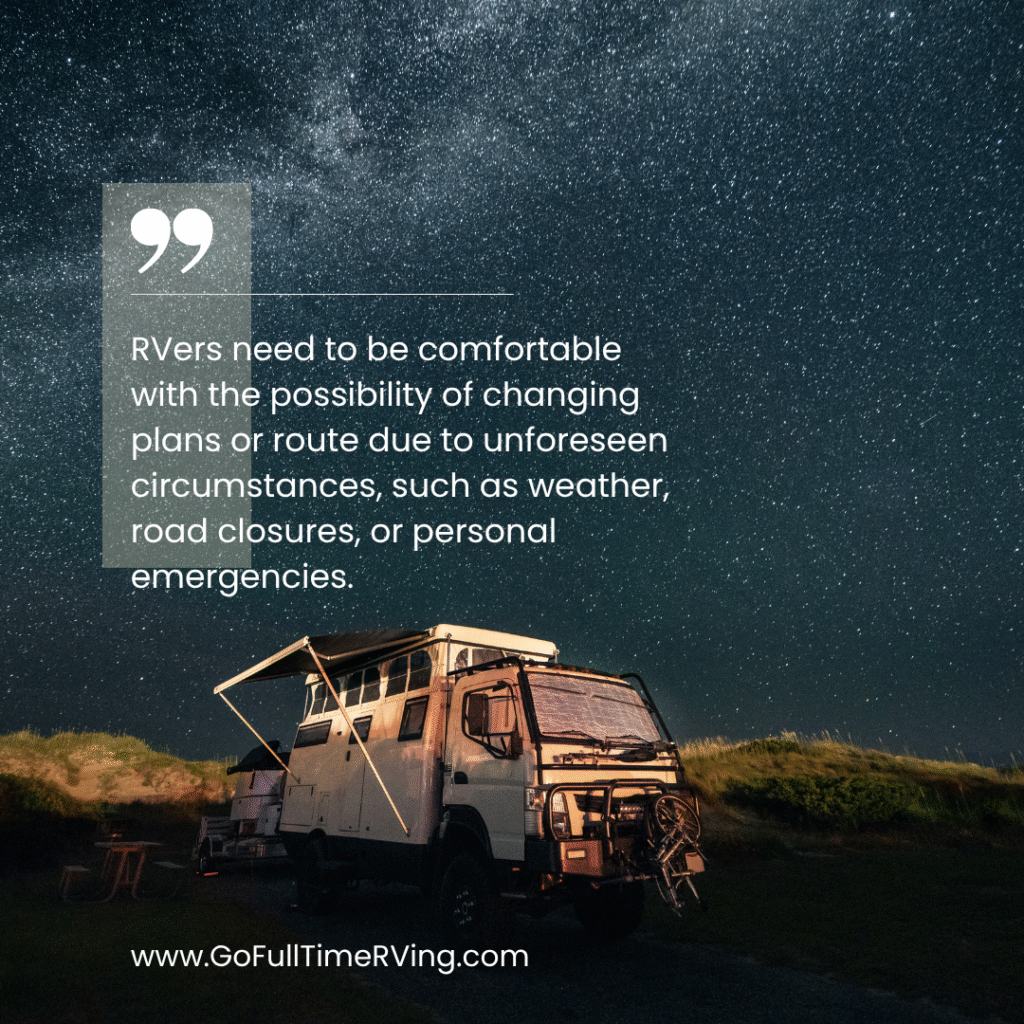
Final Thoughts for New RVers
RVing isn’t just a way to travel—it’s a whole new lifestyle. Whether you’re weekend warriors, seasonal snowbirds, or full-timers like us, RV life gives you:
- Freedom to explore
- Comforts of home
- Control over your time and surroundings
- Unforgettable memories
There will be breakdowns, bad weather, and learning curves. But you’ll also find new places, meet awesome people, and reconnect with what matters most.
Happy camping, friends!
Have questions? Drop them in the comments or reach out—Lisa and I are always happy to help
If you’re looking to build your own home-based business like we have with this webpage, check out Wealthy Affiliate.
Wealthy Affiliate is an all-in-one platform that you can build your whole affiliate marketing business on. It combines training, software, and website hosting into one. This makes the whole process of starting an online business from scratch much easier, especially if you’re new to building a website.

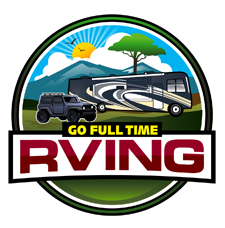
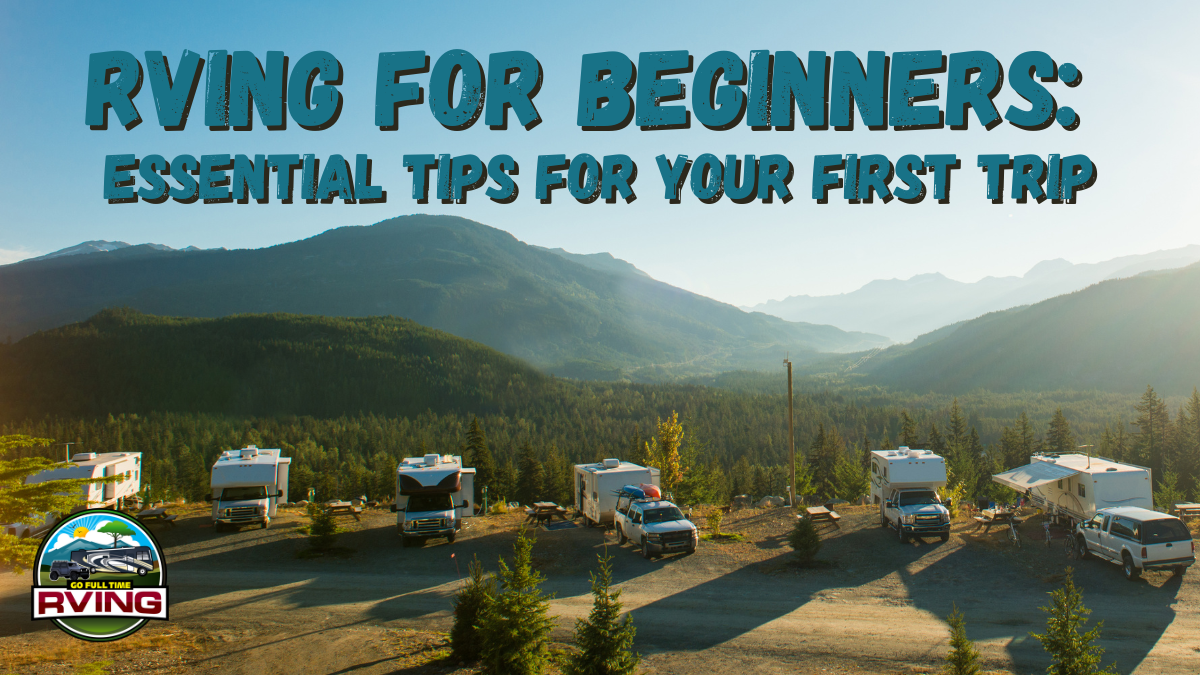

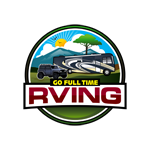
Hello Rob, Those are some really good highlights for beginners who are thinking about renting or buying an RV. I personally would like to own one, but after the breakdown of all those additions, I am not so interested. It is for anyone who is seriously thinking about owning one. You’ve done well telling them like it is. Wish you the best of success.
Hi John, Thank you for your comments. If you purchase a used one you can usually get the previous owner to throw in the additions.
I loved reading this article and have bookmarked you site for future reference as it’s a wealth of great information.
My parents owned a camping trailer (aka trailer tent) when I was a kit and we had some amazing trips with it.
Being a bit older now with kids of my own, I’d like the extra comfort that an RV gives and your list of essential accessories was a real eye opener. I never really gave these things much thought but having read your article I can see why nobody should hit the road without them.
Long term, I’d definitely like to sell up and live a life on the road in comfort. You’ll be my ‘go to’ guy both for this and for short trips in the near term.
Just wondering, what are some trips that you’ve done that really stick in your memory (for good reasons!) which you could recommend to me?
Thank you for your great comments Richard!
We were both tent campers for most of our lives. Now that we’re older it was getting harder and harder to get up off the ground without being sore in the morning. When we first started looking at RV’s we really didn’t know what direction we wanted to go with this. At first we thought weekend campers. But being “National Park Junkies” we had visited most of the Western National Parks. We joked that we needed to sell the house and move east. Then we started talking about what it would be like to live a life on the road. When the opportunity presented itself we took the chance to give it a try and sold the house and bought the motorhome.
We’ve traveled 33 states and 112 National Park units in the past year. A little too fast coming out of the gate. This year was planned to take things a bit slower and enjoy more of the areas we visited. The virus has slowed us down more than we’d like but we’re safe in a great campground.
Our favorite place we’ve been in the past year was Bar Harbor, Maine near Acadia National Park. It is truly an amazing place. We also loved Washington D.C., we camped at Fort Meade and rode the train into town the week we were there.
Please let me know if you have any other questions.
Rob
RVing is a whole new adventure that requires proper planning and the willingness to leave everything and just go for something that is literally nor fantastic. However, it could be achieved. Well! Rving gives a new chance to life and to actually live without having to stumble on the eight things. This is good to see and thank you
Thank you for your comments. RVing is a great adventure that we’re really enjoying. Even during this pandemic we’ve met some of the nicest people.
I’ve spent most of my life in metropolitan areas and I haven’t had any chance to go camping in the woods. However, after stumbling on this informative posts, the adventurous spirit in me is beginning to get awakened. I’ll get the necessary equipment listed in this post and rent an RV for a road trip. I can’t wait to see the look of excitement on my kid’s face when I tell him we’ll be going camping.
Thank you for your comments. I’m so happy that my post got you excited about getting out and going camping! It is a wonderful activity for families. There are countless beautiful places to go in the US. We’ve enjoyed exploring 33 states in the past year of our adventures. We’re ready to get back to it as soon as possible after this pandemic is done.
When you rent an RV they should supply you with all the necessary equipment. You may just need a water filter I wouldn’t think they would supply that.
Happy Camping!
What a fun article. We have been talking about checking out this fun way to live and travel- so your article for beginners was right on. The suggestions to be prepared were surprising to me, the heavy-duty electrical cord and the surge protector. Sure they make sense when I think about it, but would not have considered these two things. Then that dog bone thingy- who knew? I am sure it is better to be prepared and not having to do last-minute runs trying to get hooked up!
Thank you for adding fuel to my urge to RV fire. I feel I will be more prepared when we decide to take our trial run!
I do think it is better to do a trial weekend before investing, some options are quite costly. What is your single most favorite place to go?
Sami
Hi Sami, Thank you for your great comments. I highly recommend if RVing is something you’re thinking of doing is jumping in and doing all the research you can. We researched and planned for 5 years before we finally made our motorhome purchase. During our planning we changed our minds over and over again, thought we found the perfect RV only to change our minds to a different type.
We’ve been RVing Full Time for just over a year now. Our single most favorite place to go so far has been Bar Harbor Maine. Acadia National Park is there and it’s a beautiful and amazing place.
Take care and happy camping when you do finally check out RVing.
Rob